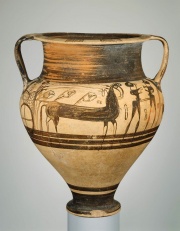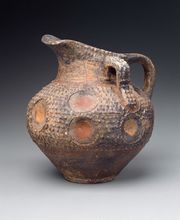Difference between revisions of "Ceramic"
Jump to navigation
Jump to search
| (3 intermediate revisions by 2 users not shown) | |||
| Line 1: | Line 1: | ||
| − | [[File:01.8044-CR772-d1.jpg|thumb|]] | + | [[File:01.8044-CR772-d1.jpg|thumb|Greek Krater<br>MFA# 01.8044]] |
== Description == | == Description == | ||
Molded or shaped items made from clay then fired to form a hard, vitrified material. [[Porcelain]], a fine-grain, high-fired ceramic, was developed in China about the 7th century CE. Porcelain, or hard paste, becomes hard, translucent and resonant when fired. In an attempt to imitate porcelain in the 18th century, Josih Spode developed [[bone china]]. | Molded or shaped items made from clay then fired to form a hard, vitrified material. [[Porcelain]], a fine-grain, high-fired ceramic, was developed in China about the 7th century CE. Porcelain, or hard paste, becomes hard, translucent and resonant when fired. In an attempt to imitate porcelain in the 18th century, Josih Spode developed [[bone china]]. | ||
| − | + | [[File:1971.632-E8825CR-d1.jpg|thumb|Minoan pitcher<br>MFA# 1971.632]] | |
== Synonyms and Related Terms == | == Synonyms and Related Terms == | ||
| Line 10: | Line 10: | ||
Examples include: bone china; porcelain; hard paste; soft paste | Examples include: bone china; porcelain; hard paste; soft paste | ||
| − | == | + | == Resources and Citations == |
| − | |||
| − | |||
| − | |||
| − | |||
| − | |||
| − | |||
| − | |||
| − | |||
* G.S.Brady, ''Materials Handbook'', McGraw-Hill Book Co., New York, 1971 Comment: p. 291 | * G.S.Brady, ''Materials Handbook'', McGraw-Hill Book Co., New York, 1971 Comment: p. 291 | ||
| Line 36: | Line 28: | ||
* Tom Rowland, Noel Riley, ''A-Z Guide to Cleaning, Conserving and Repairing Antiques'', Constable and Co., Ltd., London, 1981 | * Tom Rowland, Noel Riley, ''A-Z Guide to Cleaning, Conserving and Repairing Antiques'', Constable and Co., Ltd., London, 1981 | ||
| − | * | + | * Multilingual Glossary for Art Librarians at http://www.ifla.org/VII/s30/pub/mgl.htm |
* Art and Architecture Thesaurus Online, http://www.getty.edu/research/tools/vocabulary/aat/, J. Paul Getty Trust, Los Angeles, 2000 | * Art and Architecture Thesaurus Online, http://www.getty.edu/research/tools/vocabulary/aat/, J. Paul Getty Trust, Los Angeles, 2000 | ||
Latest revision as of 12:47, 15 August 2020
Description
Molded or shaped items made from clay then fired to form a hard, vitrified material. Porcelain, a fine-grain, high-fired ceramic, was developed in China about the 7th century CE. Porcelain, or hard paste, becomes hard, translucent and resonant when fired. In an attempt to imitate porcelain in the 18th century, Josih Spode developed Bone china.
Synonyms and Related Terms
ceramics (pl.); keramiek (Ned.); céramique (Fr.); Keramik (Deut.); ceramica (It.); cerámica (Esp.); cerâmica (Port.); keramik (Sven.);
Examples include: bone china; porcelain; hard paste; soft paste
Resources and Citations
- G.S.Brady, Materials Handbook, McGraw-Hill Book Co., New York, 1971 Comment: p. 291
- Richard S. Lewis, Hawley's Condensed Chemical Dictionary, Van Nostrand Reinhold, New York, 10th ed., 1993
- Robert Fournier, Illustrated Dictionary of Practical Pottery, Chilton Book Company, Radnor, PA, 1992
- Van Nostrand's Scientific Encyclopedia, Douglas M. Considine (ed.), Van Nostrand Reinhold, New York, 1976
- Random House, Webster's Encyclopedic Unabridged Dictionary of the English Language, Grammercy Book, New York, 1997
- The American Heritage Dictionary or Encarta, via Microsoft Bookshelf 98, Microsoft Corp., 1998
- Dictionary of Building Preservation, Ward Bucher, ed., John Wiley & Sons, Inc., New York City, 1996
- Tom Rowland, Noel Riley, A-Z Guide to Cleaning, Conserving and Repairing Antiques, Constable and Co., Ltd., London, 1981
- Multilingual Glossary for Art Librarians at http://www.ifla.org/VII/s30/pub/mgl.htm
- Art and Architecture Thesaurus Online, http://www.getty.edu/research/tools/vocabulary/aat/, J. Paul Getty Trust, Los Angeles, 2000

